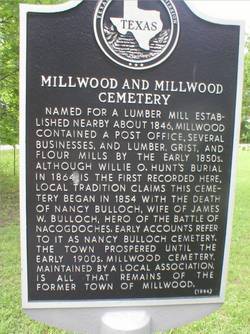From collincountyhistory.com :
[Millwood] was one of the oldest settlements in the county. People heading west for the Gold Rush would stop in Millwood for supplies. It was their last stop before California. Because the prospectors camped at the creek south of the settlement, the creek got the name of Camp Creek. At one time there were 3 mills, a school, churches, and about 200 inhabitants here. It was on a trail that went from Bonham to Rockwall to Dallas….
Some people believe this is also the Nancy Bullock Cemetery #204. Nancy Bullock’s brother, Alexander Horton, says in his memoirs that he deeded 4 acres of land for a cemetery at the time of his sister’s death in 1854. No record has been found of the deed. The stones for the Bullocks have not survived.
According to A HISTORY OF NEVADA, TEXAS, by Grace (Moran) Evans, the land for a church, cemetery, and a school was donated by J. D. Naylor. No record of that has been found either. Even though the cemeteries are probably the same ones, there is no concrete proof. The cemetery recently acquired additional acreage and has become active again.
Cemeteries of Collin County, Texas, by Joy Gough
From The Handbook Of Texas :
MILLWOOD, TX. Millwood is on the East Fork of the Trinity River ten miles east of Wylie in southeastern Collin County. The town originated during the gold rush days of 1849–50, when people infected with gold fever passed through Texas on their way to California. Because of the few established roads and trading posts in the Lone Star State, the forty-niners purchased goods wherever they could. Drury Anglin, who owned the land Millwood eventually was established on, started a general store on his farm because of the increasing number of persons who stopped at his place in search of food and supplies. Within a few years a community was organized and named Millwood because of a lumber mill near Anglin’s land. On May 21, 1851, a post office was established.
By 1885 Millwood had a population of 100, a church and school, and businesses including a flour mill, a gristmill, and a cotton gin. The community, however, never surpassed the population figure reached in 1885. Bypassed by the St. Louis and Southwestern Railway, Millwood was unable to compete with the transportation and business facilities at nearby Wylie. On December 14, 1907, the mail to Millwood was discontinued and sent to Royce City in Rockwall County, four miles southeast of the town. Over the next three decades the population of Millwood steadily declined. In 1940 the community had ten persons and one business. In 1986 these figures remained the same.
